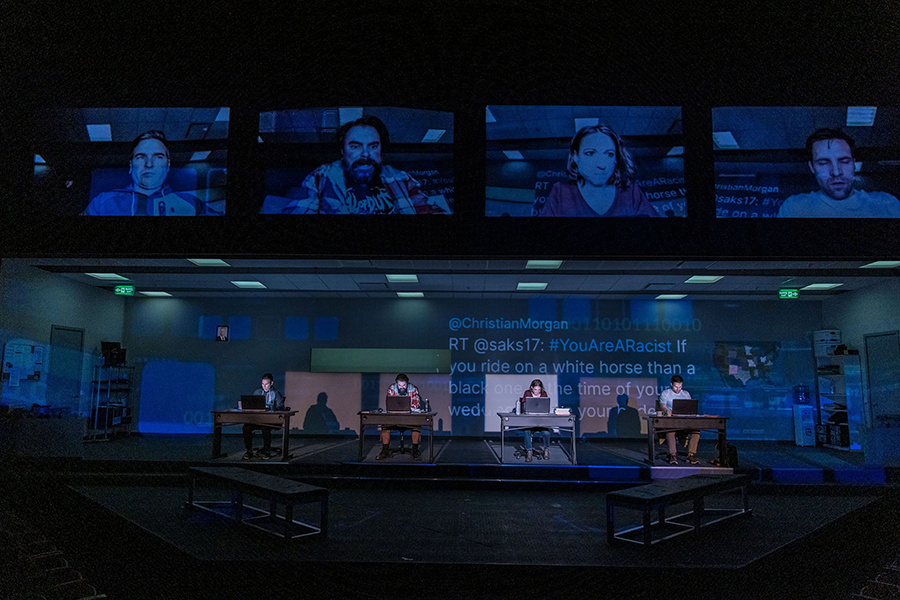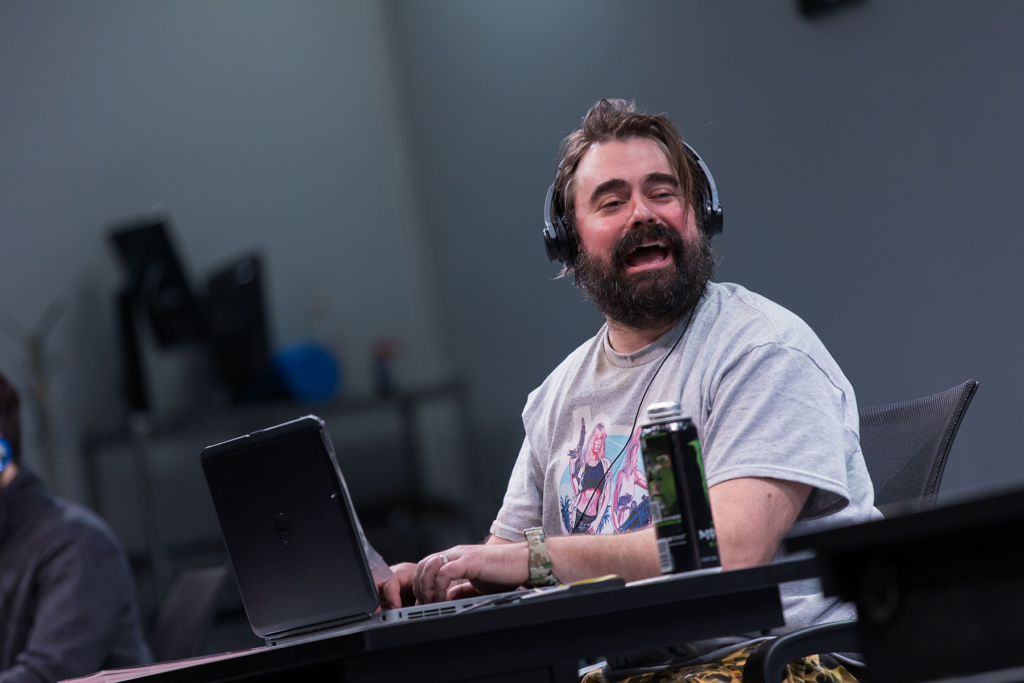Energizing and Engaging Fun at GEVA
A REVIEW OF SARAH GANCHER’S RUSSIAN TROLL FARM
–D.E. BENTLEY
Now through March 26th on GEVA Theatre’s Wilson Stage:
Tickets and information at gevatheatre.org.

Credit: Ron Heerkens Jr – Goat Factory Media
I like theatre where the staging, performances, and rhythm build on and echo the themes of the play. In this regard, Russian Troll Farm, a dark comedy written by Sarah Gancher, does not disappoint. The rapid fire twitter messages and the manic mannerisms of the actors—as workers seeking to create division in advance of the 2016 US presidential election—mirror the exponential rise of fake social media’s deliberate and strategic use of lies to engage and enrage. From the opening beats, the projection and multimedia wizardry of two-time OBIE Award-winning theater artist Jared Mezzocchi further pulls us into a dizzying digital world.
The 2020 online production of Russian Troll Farm was a New York Times Critic’s Pick. The play’s (at times) hilarious energy and serious contemporary theme carries over with GEVA’s entertaining in person world premiere—through March 26th on the Wilson Stage. GEVA Theatre’s production of Russian Troll Farm is directed by Darko Tresnjak and produced by Dori Bernstein. It features the same core creative team as the online production which, in addition to Gancher and Mezzocchi, includes dramaturg and Geva Theatre Artistic Director Elizabeth Williamson. They are joined by scenic designer Alexander Dodge and costume designer Linda Cho. GEVA’s Russian Troll Farm cast features Julia Brothers (Ljuba), Chris Ghaffari (Nikolai), Renata Friedman (Masha), Haskell King (Egor), and John Lavelle (Steve).
The primary setting for Russian Troll Farm is an office at the State run Russian Internet Research Agency, in St. Petersburg. The simple but effective sets—with exit doors stage left and right and computer desks /miscellany for an office environment interchanged with floating seating for night club social scenes—are contemporized through Mezzocchi ‘s elaborate lighting and digital backdrop—which displays tweets while also serving to transition scene changes.
Gancher was inspired to write Russian Troll Farm when she, like so many of us, became obsessed with social media in advance of the 2016 election. She noticed irregularities in some of the posts and questioned their integrity. After researching troll farms, she became intrigued by the lives of the trolls, whose job is to create stories to “make Americans feel divided and hopeless.”
What is art if not experimentation, and Gancher’s creative use of theatrical styles energizes in new ways while remaining rooted in playwriting traditions. She takes us on a fast paced journey: from comedy to nightmarish fascination, from vengeful drama to historical epic. There are no calm waters once we leave the shore; we are hooked.
She also delves into the minds of the trolls as they, too, become increasing sucked into the mechanization of professional propaganda. The characters offer us possible insight into the underlying motivations for the real-life workers—with generous salaries as the most likely lure. Rooted in a surreal reality that continues to capture the public psyche (85% of the tweets displayed in the play were written by Russian trolls), Gancher’s fantastical and, at times, frightening characterizations of the workers were captivating.

Credit: Ron Heerkens Jr – Goat Factory Media
Most riveting were the performances by Julia Brothers as Ljuba—offering an emotionally rendered insight into how personal experiences compel us to believe in and embrace evil as just—and John Lavelle as Steve. Some characters are just more fun, and are, I imagine, also more fun to portray. The creative team’s development of the character Steve, a deliberate and lighthearted nod to the malevolent mythical trolls of lore, was passionately executed by Lavelle, most notably during a delightfully delusional escapist scene. Yes, he is obnoxious, but isn’t he also a bit cute and alluring? Steve’s profane fantasy sequence takes us into the dark depths of the human psyche and further mimics the nature of trolling, and those trolled.
As a side note, for those ill versed, a characteristic of the mythical trolls, most associated with Norwegian mythology, is an evil nature. Caleb Madison’s May 9, 2022 newsletter in the Atlantic summarizes well the relationship of these frightening creatures to the online troll factories.
“Four hundred years ago, trolls haunted the dark forests of Scandinavia looking for lost humans to club on the head with trees, drag back to the depths of their caves, and eat. Now they haunt the dark forests of social media looking for lost posters to goad with inflammatory comments, drag into the depths of a pointless passionate argument, and enrage for as long as possible.” Trolling is also in common use, since the 1600s, as a “process by which one or more baited hooks are drawn slowly through the waters…keeping the bait moving gives it the appearance of life, making it a much more attractive option for fish to chomp down on.”
The humanity of the workers emerges through their attempts to find creative avenues of expression despite being in a system of strict controls. Even Egor, with his stoic acceptance, harbors a satirical undertone and eventually rises to mischief, if only to better serve the State. They all, at one point or another, attempt acts of autonomy. Dissent is challenging and risky given the likely intense level of surveillance that these troll workers are under. The potential for human triumph over authority left me wondering if there were trolls who used their positions to manipulate the manipulators, applying their skills, in part, in the pursuit of good rather than evil.
The Russian Troll Farm offers a worthy fictionalized glimpse inside a troll farm that should give anyone vulnerable to social media—is there anyone who is not vulnerable—cause to pause and consider the sources of messages. Although this may not be the case for those who have grown up immersed in online interactive media, I found that the intensity of the play’s multimedia distracting; this was likely deliberate given the play’s theme. The extent of Russian influence in the 2016 US electoral outcome was negligible, but the resulting polarization and the presence of an ongoing online threat is undeniable. Digital authoritarianism to control populations and influence political outcomes is rampant around the world, including domestically. Everyone is vulnerable in political systems that prioritize social divisions and nationalistic authority over human freedoms and fulfillment.
I am drawn most to drama that compels inner dialogues, long after the resolution. Russian Troll Farm offers insight into how governments manipulate and control populations of citizens and encourages further historical reckoning of past (and ideally future) systems of surveillance and influence. After an entertaining and insightful evening of artistic theatrical immersion, I paused to read news headlines, turning—as most people do—to my preferred sources. Perhaps Sarah Gancher’s contribution to the conversation will inspire us to explore beyond our silos. As the bouncing and manic mannerisms of the troll workers lure us hopelessly to laughter, Russian Troll Farm also reminds us to be a bit more aware. All is not what it may seem.

2 thoughts on “Energizing and Engaging Fun at GEVA”
Comments are closed.
‘The extent of Russian influence in the 2016 US electoral outcome was negligible’ – you must be joking, right? Are you trolling your readers? Shame on you. How can you possibly write such a high minded and insightful piece about this topic and then drop this preposterous comment in at the end? There’s absolutely no question that the Russians deliberately and systematically influenced the results of the 2016 election – which is an act of war. And the fact that you say it was ‘negligible’ completely undermines your piece, your integrity, and your intellectual bone fides. Booooooooo.
Hi David,
No deletion of any of your comment(s), just spending time away from the machine for a bit and had not yet approved the comment for posting, a necessary step in these times of trolling and phishing, I’m afraid (I have now approved your initial comment; I love and welcome reasoned debate, so thanks for writing).
Thanks, also, for the almost complement.
The relevant full sentence read, “The extent of Russian influence in the 2016 US electoral outcome was negligible, but the resulting polarization and the presence of an ongoing online threat is undeniable.” Based on what I have read from a number of sources, the election outcome would have still been close to the outcome we saw, even without the Russian influence (the People were looking for a false prophet). The vast polarization (I live rurally, so felt big time here) is well documented and palpable. This is, I believe, where the greatest damage has been done; let’s not let that get it the way of a good discussion.